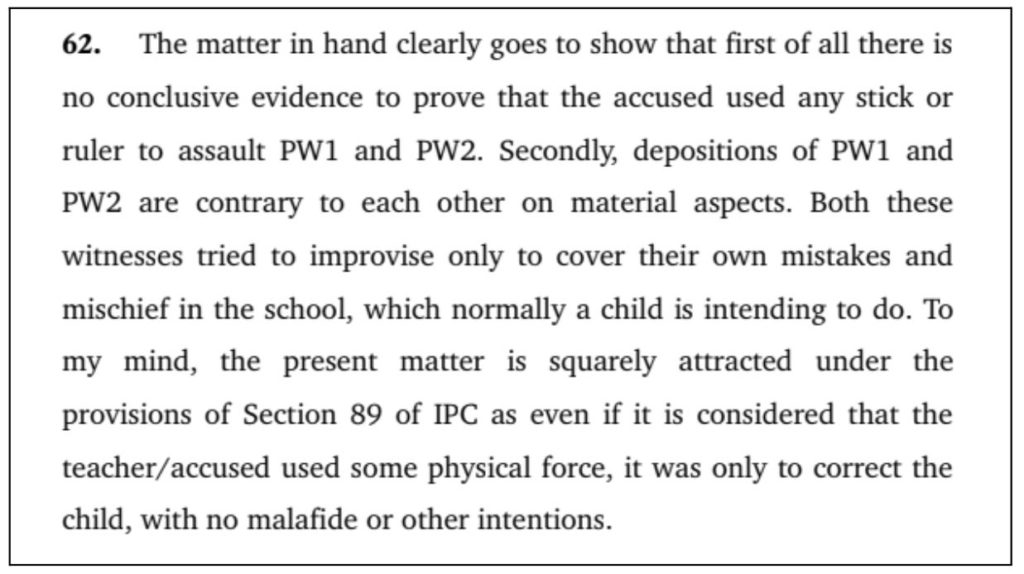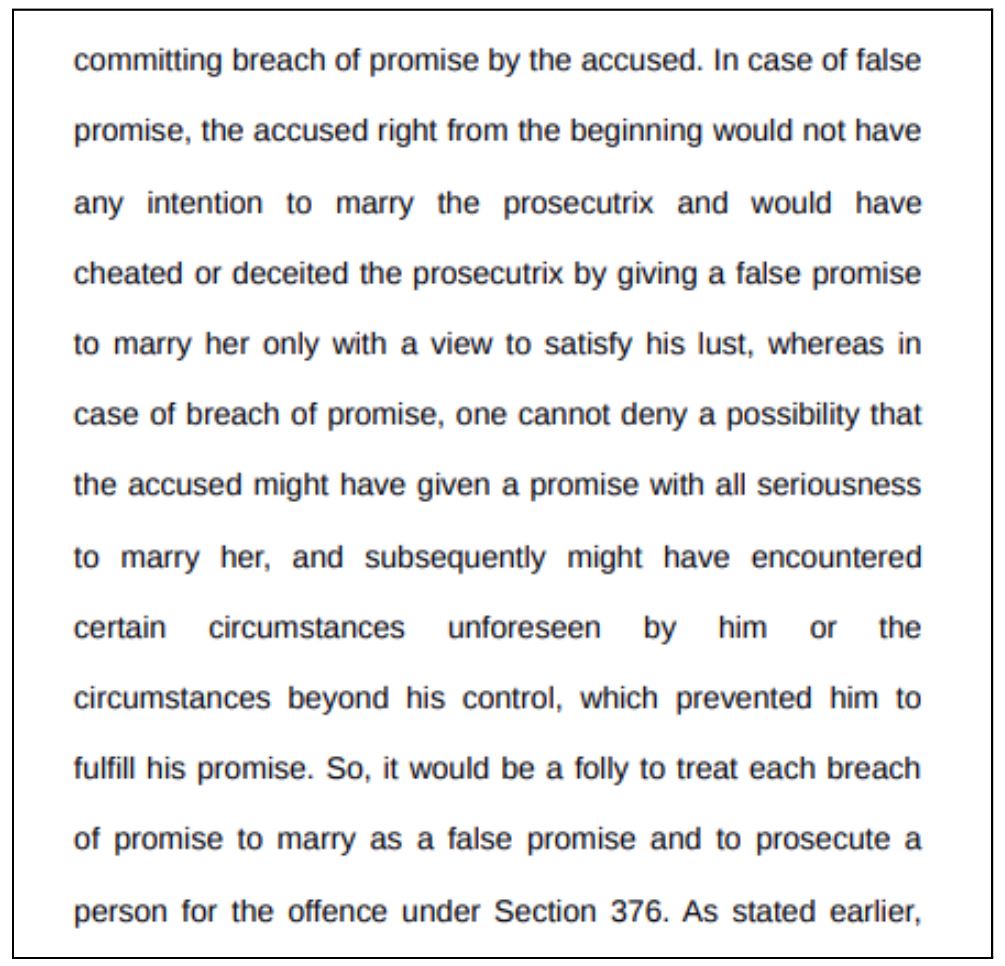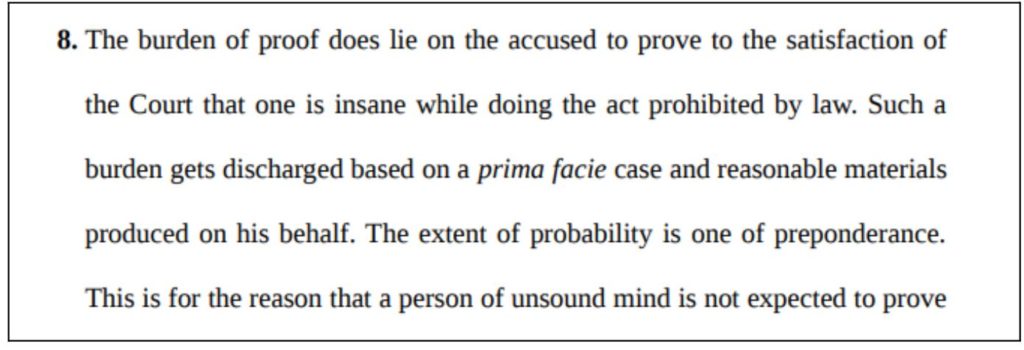In this week’s review of Court Judgments, we look at the Mumbai HC’s order noting that teachers using force to correct children is for the child’s benefit and does not constitute an offence, SC’s ruling that Every breach of promise to marry in consensual physical relationship is not rape, SC’ ruling that inability to pay court fees is not a sufficient reason to condone delay to file appeal, and SC’s simplified guidelines on advance directives & procedure for passive euthanasia.
Mumbai HC: Teachers using force to correct children is for the child’s benefit and does not constitute an offence
In Rekha @ Vidhila Faldessai vs. State, the appellant was a teacher. She was convicted by the Goa Children’s Court under Section 324 of IPC and under Section 2(m)(i) punishable under Section 8(2) of the Goa Children’s Act, for beating two sisters aged 6 and 9 years with a stick, back in 2014. The offences were for voluntarily causing hurt and child abuse. She was sentenced to pay a fine of Rs. 10,000 for the offence under Section 324 of IPC and a simple imprisonment for a term of 6 months. With respect to the offence under Goa Children’s Act, she was sentenced to undergo simple imprisonment for one day and to pay a fine of Rs. 1 lakh.
Justice Bharat P. Deshpande of the Goa Bench of the Bombay High Court quashed the conviction. He observed that the testimonies of the students were contradictory. Further, their medical reports also showed that they had no injuries. The Bench also noted that there was no conclusive evidence that the teacher used a stick or ruler to beat.
In the judgement, the Bench stated that there is no definition of corporal punishment in the Goa Children’s Act which banned the form of punishment in schools. Referring to the Black’s Law Dictionary which defined corporal punishment as a physical punishment as distinguished from pecuniary punishment or a fine; any kind of punishment of or inflicted on the body. The legislation also stipulates the procedures to be followed by the institutions. The police too should have either conducted a preliminary inquiry or asked the complainants to approach competent authority to do so.
Further, the Court noted that the incident was quite normal in a primary school as teachers may sometimes be a bit harsh to discipline the students and to inculcate good habits. It is done in good faith with no mala fide intention for the child’s benefit and with the consent of the guardian. It also noted that if the teachers are in fear of such allegations for trivial matters and for correcting children, it would be difficult for conducting schools thereby giving proper education and for maintaining discipline.

SC: Every breach of promise to marry in consensual physical relationship is not rape
The case Naim Ahamed vs. State (NCT of Delhi) is an appeal filed by the appellant accused against the judgment of the Delhi High Court. The case before the Sessions Court involved a married woman with 3 children. A child was born out of the relationship between the accused and the prosecutrix who were neighbours. It was only later she got to know that the accused was a married man having children. After a few years, she lodged a complaint against the accused alleging that she had consented to a sexual relationship with him as he had promised her to marry and later didn’t. The Sessions Court had directed the appellant to pay compensation of Rs. 5 lakhs to the prosecutrix and ten years imprisonment with a fine of Rs. 50,000 while the High Court reduced the duration of imprisonment and fine.
A bench of Justices Ajay Rastogi and Bela M Trivedi of the Apex Court while hearing the appeal analysed the phrases “consent under a misconception”, “rape”, “false promise,” etc. The bench noted that it would be a folly to treat each breach of promise to marry as a false promise and to prosecute a person for rape. In this case, the Bench noted that the woman was married with children and so, it cannot be said that she acted under the alleged false promise given by the appellant or under the misconception of fact while giving consent to having a sexual relationship with the appellant. Her conduct during the entire relationship was a betrayal of her husband and children and despite knowing that he was married, she continued to stay with him after the divorce, the bench stated. The court acquitted the appellant of rape charges and directed him to pay Rs. 5 lakhs to the woman for their child born out of wedlock.

SC: Inability to pay court fees is not a sufficient reason to condone delay to file appeal
The cases, Ajay Dabra vs. Pyare Ram & others and Ajay Dabra vs. Sunder Singh & another are surrounding the sale of land in Himachal Pradesh. A contract was executed between the defendant and a company for the sale of ‘agricultural land’ in the state in which it was stipulated that the defendant would secure the necessary approval from the government in a fixed time. However, this approval was not given by the State following which the suit for specific performance was filed by the plaintiff. There were two plots of land for which two different agreements were executed and so different civil suits were filed.
The plaintiff had initially filed an appeal at the High Court of Himachal Pradesh which dismissed the delay condonation applications filed under Section 5 of the Limitation Act, 1963, declining condonation of the delay by 254 days to file the first appeal as the reasons assigned for the same were insufficient. The reason submitted was that they did not have enough funds to pay the court fee. The SC Bench consisting of Justices P S Narasimha and Sudhanshu Dhulia also noted that the appellant could have filed the appeal on time under Section 149 CrPC which provides relaxation to pay the fee while the appeal is filed. The Court further noted that the appellant was an affluent businessman and a hotelier, and the inability to pay the fees was not a sufficient reason for the delay.
Dismissing the appeal and withholding the High Court’s order, the SC Bench also added that the Himachal Pradesh Tenancy and Land Reforms Act, 1972 allowed only agriculturists engaged in cultivation to purchase land in Himachal Pradesh. Others would require prior permission from the state government to purchase land in the state. The purpose of this legislation is to save the small agricultural holding of poor people and check the conversion of agricultural land for non-agricultural purposes.
SC: The burden of proof on the accused to prove plea of insanity under Section 84 of IPC is one of preponderance of probability
In Prakash Nayi @ Sen vs. State of Goa, the appellant was convicted by the High Court of Bombay at Goa as well as the Trial Court for murder under Section 302 of the IPC. The appellant approached the Supreme Court with a plea of insanity as per Section 84 of IPC which states that the acts of a mentally unsound person are not offence.

The SC Bench of Justices B R Gavai and M M Sundresh noted that the appellant was undergoing treatment for schizophrenia when the offence occurred in 2004. There was evidence that he had undergone in-patient treatment at a Government Medical College Hospital for mental illness. Doctors had also testified before the Court regarding the illness of the appellant. However, the Trial Court and the High Court dismissed this.
Acquitting the appellant and quashing the orders of the Trial Court and the High Court, the SC Bench noted that both the courts were influenced by the nature of the act and ignored the appellant’s condition and the fact that the burden on the accused is one of the preponderance of probability. In such cases, the accused has to prove before the Court that they were insane when committing the offence. Though the presumption is that a person is sane, once there are adequate materials available before the Court, the presumption gets discharged.

SC: Simplified guidelines on advance directives & procedure for passive euthanasia
With regards to Common Cause vs. Union of India, an application was filed by the Indian Society of Critical Care Medicine seeking clarification of the judgment following which the Supreme Court passed an order modifying the guidelines regarding the execution and enforcement of advance care directives and the procedure for passive euthanasia. A Constitution Bench comprising Justices K M Joseph, Ajay Rastogi, Aniruddha Bose, Hrishikesh Roy, and C T Ravikumar passed the order.
The judicial magistrate of first class’s Countersign for attesting the document to withdraw life support of a terminally ill person by way of a living will have been done away with. The new rules allow attestation of the document before a notary or Gazetted Officer. The requirement that the judicial magistrate forwards a copy of the document to the registry of the jurisdictional district court and maintains it has been deleted. In case the primary medical board takes a decision not to follow an advance directive, the nominees of the executor can request the hospital to refer the case to the secondary medical board for consideration and for passing appropriate directions. Earlier, the application was made to the medical board constituted by the collector for considering and passing appropriate directions with respect to the document. Also, before taking a final opinion, if the executor is incapacitated, the consent taken was restricted to the guardian or close relative. It has now been expanded to all nominees.


